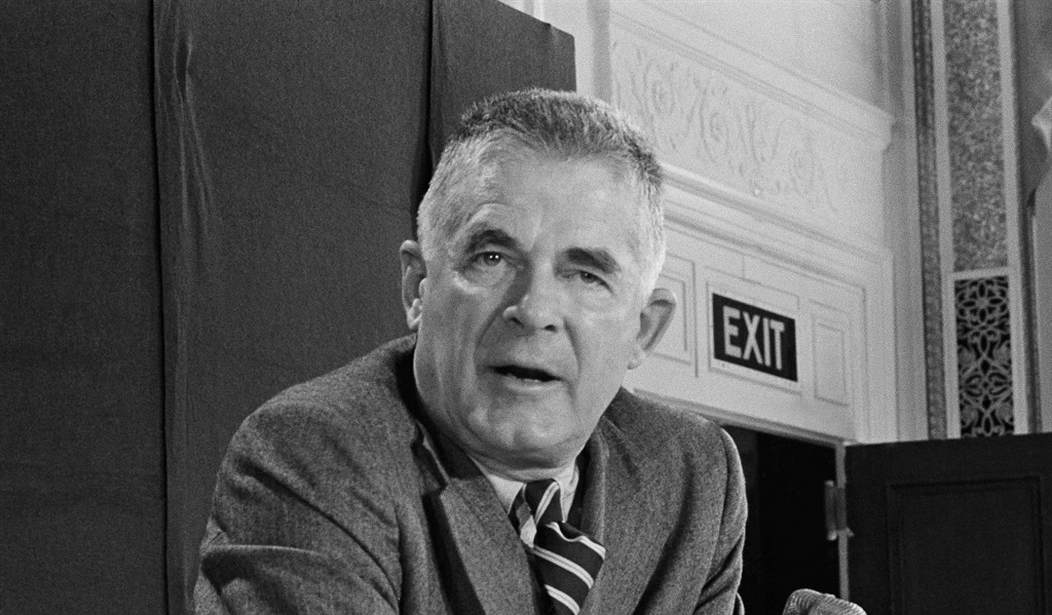Do the allegations of Russian influence and potential collusion in the 2016 election amount to a new Watergate? Is it even a scandal at all? Bob Woodward, who along with Carl Bernstein chronicled the Watergate scandal, tells the Washington Post’s Peter Stevenson that we don’t really know enough to answer either question. Woodward wonders what the rush is to declare answers ahead of evidence on those questions, preferring the “we’ll see” approach:
Woodward: It’s clearly a legitimate investigation, and Trump doesn’t like it. We’ll see. Some people think it’s a coverup already. Others think there’s no evidence, and let’s see. And what’s worrisome to a reporter interested in getting facts is, this is so polarized, this is so emotional. This is driven by tweets and assertions from people who don’t really know. It’s too bad we live in this Internet culture of impatience and speed, and it does not set us on the road to gathering facts.
Fix: In that same vein, are people rushing to the Watergate comparison too quickly? Are Trump’s opponents so alarmed by his presidency in general that they want to see it that way?
Woodward: Lots of people are alarmed by the Trump presidency, some people for partisan reasons; they’re probably hyping this up. But this is pretty extraordinary. Don’t dilute the moment when the president, kind of out of left field, says, “I’m firing the FBI director, who has a fixed term, can only be fired for cause.” Trump has decided he has cause, and I guess Comey is at home now. He’s no longer at FBI headquarters. I think it’s very important — I was listening to Sen. Lindsey O. Graham this morning, and he said, okay, let’s take it one step at a time. We can afford to do that. I’m for that. I’m for the media, which I think now has a quadruple responsibility to work hard on this — the various investigations, the FBI, the Senate, the House, to dig in and be patient.
The firing of James Comey had some people making comparisons to the infamous “Saturday Night Massacre” in 1973, where Richard Nixon fired the man responsible for investigating Watergate. That’s not an apt comparison, Woodward argues, as Nixon’s actions went far beyond what Trump did with Comey, and did so after much more specific witness testimony and evidence had already emerged:
It’s so important to understand what John Dean was saying: specifics, dozens of calls, meetings saying the president orchestrated and was the leader of an illegal obstruction of justice. Dean testified to his own motive, which he said was corrupt, and that the president was corrupt. So you had a firsthand witness, and in the Trump case, there’s a lot of suspicion — genuine, well-founded suspicion, but no John Dean testifying with the kind of specifics, “On March 21 we met and I said we need maybe a million dollars to pay the Watergate burglars for their silence,” and Nixon says, “Well, I know where we can get a million dollars.” Nothing like that. Nothing comparable. Maybe there will be at some point. No comparable evidence trail, where there were suggestions of a secret taping system or suggestions of absolutely foolproof evidence.
So you get to the Saturday Night Massacre. Nixon’s not firing the FBI director, he’s firing the boss, the special prosecutor, Archibald Cox. There was such a firestorm, dozens, as I recall, of resolutions introduced in the House of Representatives to introduce an impeachment investigation, so what did Nixon do? He blinked. He said, okay, we’ll have a new special prosecutor — it turned out to be Leon Jaworski, and the second thing — at that moment, there was an order from a federal court of appeals saying he had to turn over a group of tapes, and he said, “Okay, I’ll do it.” And so he turned over evidence that turned out in itself to be quite incriminating to him. So you have a very different situation.
Of course, one can make the argument that Comey was in charge of the investigation into the Russia allegations too, but that’s not truly comparable to Cox’s position. Comey was also running the FBI as a whole, and not inconsequentially, had basically lost the confidence of both Republicans and Democrats for reasons laid out in the Rosenstein letter. Cox’s only job as special prosecutor was investigating Watergate, and as Woodward notes in the interview, was given that job by then-Attorney General Eliot Richardson as a direct mandate from Congress, a condition of Richardson’s confirmation. Nixon couldn’t fire Cox himself; only the AG had that authority. When Richardson refused to fire Cox, Nixon fired him instead, and Richardson’s deputy William Ruckelshaus resigned when he also refused to fire Cox. Robert Bork, who was next in line at the Department of Justice, finally agreed to fire Cox, which set the stage for Bork’s poisonous confirmation hearing when Ronald Reagan nominated him to the Supreme Court.
Nixon’s abuse of power and its direct connection to an investigation to other abuses of power were obvious and undeniable; there is no evidence of either abuse of power or a cover-up in this case. Cox’s firing stopped his investigation (until Nixon was forced to appoint Leon Jaworski to replace Cox); Comey’s firing only removes Comey from the FBI’s ongoing investigation. Woodward’s correct to argue that we don’t have evidence of anything, at least not yet, so it’s better to allow investigators to do their jobs rather than endlessly speculate about what they’ll find or whether they’ll find anything.
Addendum: The front page picture is of Archibald Cox, from the Associated Press’ archive. Also, allow me to renew my fervent plea to media outlets to find some other way of signifying scandal other than attaching a “-gate” to some other word.







Join the conversation as a VIP Member